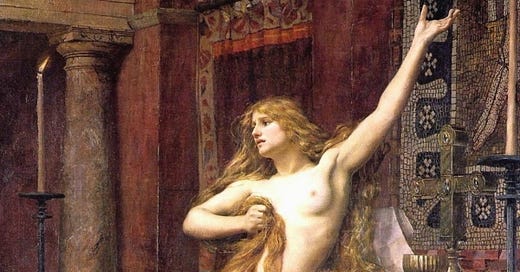A ghost (writer) like Hypatia | Female Authors
Hypatia is one of the greatest lost voices of all times: not a witch, not a martyr. I suggest you a nice book about her!
Female Voices - Women Writers to Remember
by Alessia Pizzi
N.2 - October 2022
When I wrote that this newsletter was a place to remember women writers, I meant all the writers: including those about whom we cannot read any written text.
Hypatia is one of the greatest lost voices: at the age of thirty she ruled the school of Alexandria (Egypt). In march 415 (AD) she was murdered, probably because of her power.
First things first
What a shock would it be if a woman appeared in your book of philosophy? There wasn’t room for a female genius in ancient Greece. It is not a case if, except for Sappho, women at the time were only described on gravestones as good wives, good daughters and good mothers. The reason is very simple: women were denied access to the public world.
Hypatia is indeed an exception, but unfortunately very little direct evidence on her has survived. She was surely educated and influential, and she was brutally killed by Ciril of Alexandria’s supporters because they thought she bewitched Orestes, the praefectus augustalis of Alexandria, in order to obstruct the bishop.
That’s what women do after all: they bewitch men. They’re not able to do something good, especially when they reach power.
But what power could a female philosopher have in Alexandria?
A lot, actually. At the time being a philosopher was a real job: many of them believed they could improve the State. Hypatia perfectly fits in this picture: in a historical moment dominated by contrasts, primarily the struggle between Christians and Pagans, philosophy became a strong public voice, especially in the political context.
Nobody’s Martyr
In the last 2000 years scholars, poets, writers and even movie makers worshipped and hated her, painting her as a witch, a feminist icon and a martyr as well. The last feature is very easy to understand thinking about her murder: a crowd of Christians assaulted her, ripped her clothes and hurt her with pottery fragments, tore her eyes out and dragged her body to the streets of Alexandria. Then they burned her corpse. In the end scholars were more interested in her terrible death than in her life.
Who was Hypatia? She was surely a woman who had the chance to step into a man’s role. Her school was well known and attended by both Christians and pagans. Platonism suggested by Hypatia was perfect for both of them thanks to the idea of merging philosophical study with divine. Her philosophy was pretty much contemplative and surpassed her father’s teaching pretty soon.
In life Hypatia was a key figure in the struggles of her age: for this reason her voice had such a wide appeal in a megalopolis with very different souls like Alexandria.
Hypatia: The Life and Legend of an Ancient Philosopher
Edward J. Watts, professor of history at California University (San Diego), draws a portrait of one of the most famous woman of ancient times.
In less than 200 pages we can outline more clearly a historical figure whose profile is very blurry in our minds. We can also retrace the life of a great woman without prejudices, understanding the historical background without falling asleep.
Watts’ research is written in simple English and offers a punctual reconstruction. The book is published by Oxford University Press, one of the best publishers in the field of women’s studies.
This review was first published in italian and in english on my website Culturamente.it




